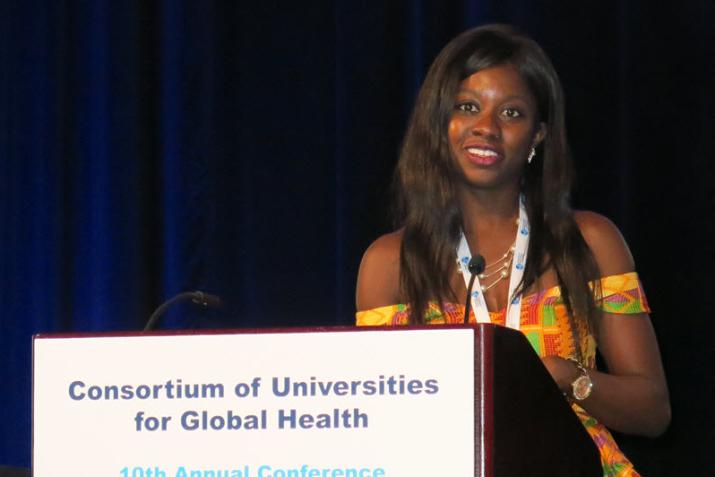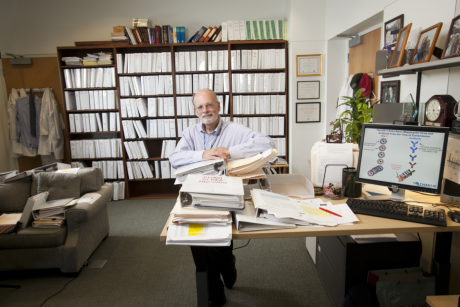
Mercy Asiedu gives remarks after receiving her award.
Published March 11, 2019, last updated on April 1, 2020 under Education News
Mercy Asiedu, a fifth-year PhD candidate in biomedical engineering, received the CUGH/Wasserheit Young Leader Award at the 10th annual Consortium of Universities for Global Health (CUGH) Conference in Chicago in April 2019. Asiedu, a global health doctoral scholar at the Duke Global Health Institute, conducts research centered on using light to detect cancer in low-resource areas.
The CUGH/Wasserheit Young Leader Award is given to an individual under 30 years old who has demonstrated strong leadership abilities, established collaborations with colleagues in resource-poor settings and shown outstanding achievement in addressing health disparities through education, research, advocacy and/or service.
Working under the mentorship of Nimmi Ramanujam, the Robert W. Carr Professor of Biomedical Engineering and a Duke Global Health Institute faculty member, Asiedu has pioneered the development of a speculum-free colposcope that transforms the conventional gynecological exam. Leveraging her background in mechanical engineering, she created the Callascope, an inexpensive device that connects with a smartphone to deliver images of the cervix comparable to a traditional $15,000 colposcope.
Asiedu has pioneered the development of a speculum-free colposcope that transforms the conventional gynecological exam.
Asiedu has conducted volunteer and clinical studies to demonstrate the clinical impact of the Callascope, and she is developing machine learning algorithms for automated cervical cancer detection. She has also garnered funding to implement the Callascope in Ghana, her home country. In addition to her research and product development work, Asiedu is co-leading an art campaign with her peers to use the Callascope to change the narrative on shame and invisibility in order to mobilize women to seek cervical cancer screening.
“I am very grateful to have received this award,” said Asiedu. “Biomedical engineering appealed to me because I recognized technology as a limiting factor for healthcare in places like Ghana, where I am from. My doctoral thesis on developing technologies for cervical cancer screening to address health inequalities combined with my global health certificate and fellowship have really given me the chance to start working towards addressing these issues.“
This award marks the second time Asiedu was recognized by CUGH for her leadership. At the 2018 conference, she received the Drs. Anvar and Pari Velji Emerging Leader in Global Health Innovation Student/Trainee Award.
“I’m delighted that Mercy won this award,” said Ramanujam. “She has the creativity, tenacity and leadership skills to transform women’s health.”


